Overview: Corrugated Steel Roofing’s Popular and Essential
Corrugated steel roofing is one of the most durable and cost-effective roofing options available. Its strength, resistance to extreme weather, and long lifespan make it the preferred choice for both commercial and residential buildings. But it’s not just about practicality. Corrugated steel roofing has evolved from a utilitarian product into one that can be aesthetically pleasing, available in various finishes and designs.
In this guide, we’ll dive into the intricate details of corrugated steel roofing, covering everything from the types available to the installation process, key components, models, working mechanisms, and maintenance tips. Whether you’re a contractor, DIY enthusiast, or homeowner considering a steel roof, we’ll guide you through the essentials and help you make an informed decision.
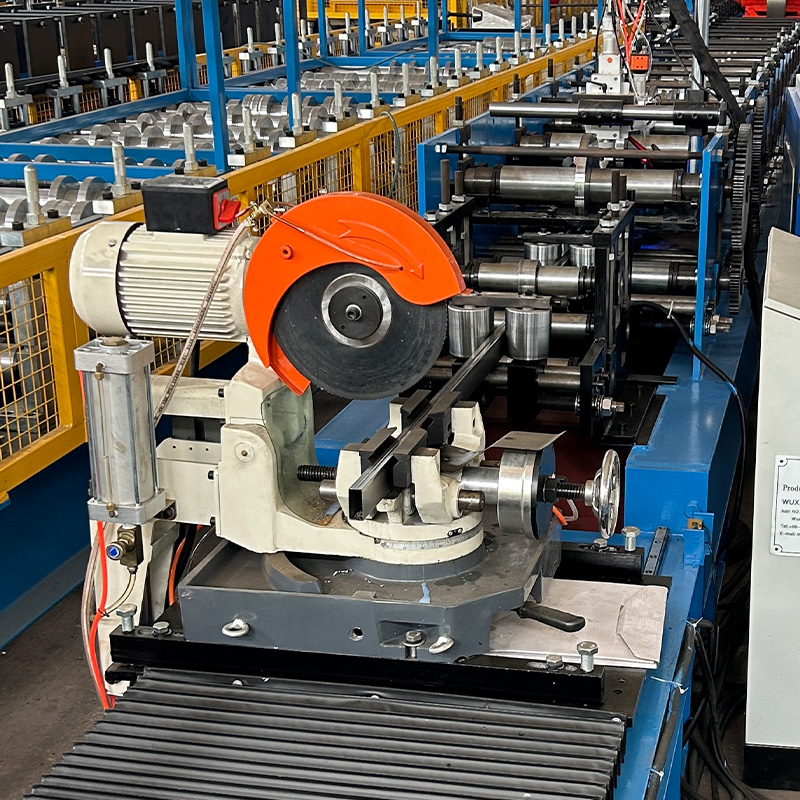
What is Corrugated Steel Roofing?
Corrugated steel roofing is a type of metal roofing system made from sheets of steel that have been pressed or rolled into a wavy, corrugated pattern. The purpose of corrugation is to enhance the material’s strength and durability by distributing stress more evenly across the sheet. The wave-like structure of the material creates a strong but lightweight option that holds up well under heavy rain, snow, and even high winds.
Types of Corrugated Steel Roofing
There are different types of corrugated steel roofing, each suited to different applications, environments, and preferences. These types vary by coating, pattern, material composition, and thickness, all of which impact their performance and durability.
Galvanized Corrugated Steel Roofing
Galvanized steel is coated with a layer of zinc, which provides excellent corrosion resistance. This type of steel roofing is highly durable, relatively lightweight, and can last up to 50 years with proper maintenance.
Galvalume Corrugated Steel Roofing
Galvalume is a mix of zinc, aluminum, and silicon that offers superior corrosion resistance compared to galvanized steel. It’s perfect for environments that experience salt spray, making it ideal for coastal regions.
Stainless Steel Corrugated Roofing
For extreme environments, stainless steel provides unparalleled rust resistance. It’s pricier than galvanized or Galvalume steel but offers unmatched durability in areas where the risk of corrosion is high.
Aluminum Corrugated Roofing
Aluminum is a lightweight alternative with natural resistance to rust and corrosion. This material is often used in coastal areas due to its ability to withstand salty environments without corroding.
Painted Corrugated Steel Roofing
Pre-painted steel roofs combine functionality with aesthetics. These roofs come with a variety of finishes and colors, providing homeowners with design flexibility without sacrificing durability.
Copper Corrugated Steel Roofing
Although not made entirely of steel, copper is often considered a part of the metal roofing family. Copper roofing provides a distinct, premium look and develops a patina over time. However, it is much more expensive than traditional steel roofing.
Stone-Coated Steel Roofing
Stone-coated steel roofing consists of steel sheets coated with a layer of stone granules. This provides a traditional appearance similar to shingles or tiles while offering the durability of steel.
Zinc-Aluminum Alloy Roofing (ZAM)
ZAM roofing is a specialized zinc-aluminum-magnesium alloy that offers high corrosion resistance and self-healing properties, ideal for harsh climates.
Cold-Rolled Corrugated Steel Roofing
Cold-rolled steel is shaped at room temperature, making it stronger and more durable. It has a clean, smooth finish, and is often used in industrial applications.
Corrugated Steel Roofing Types Comparison
| Roofing Type | Materials/Coating | Corrosion Resistance | Best For | Durability | Price Range |
|---|---|---|---|---|---|
| Galvanized Steel Roofing | Zinc Coated Steel | Good | General Use | 40-50 years | $$ |
| Galvalume Steel Roofing | Zinc, Aluminum, Silicon | Superior | Coastal, Harsh Climates | 40-60 years | $$ |
| Stainless Steel Roofing | Chromium, Nickel | Excellent | Industrial, Coastal | 50+ years | $$$ |
| Aluminum Corrugated Roofing | Pure Aluminum | Excellent | Coastal, Residential | 50+ years | $$$ |
| Painted Corrugated Steel Roofing | Pre-Painted Steel | Good | Residential | 40-50 years | $$ |
| Copper Corrugated Roofing | Copper | Excellent | High-End, Aesthetic | 70+ years | $$$$ |
| Stone-Coated Steel Roofing | Steel with Stone Granules | Good | Aesthetic, Residential | 40-50 years | $$$ |
| Zinc-Aluminum Alloy Roofing | Zinc, Aluminum, Magnesium | Superior | Harsh, Industrial Areas | 50+ years | $$$ |
| Cold-Rolled Corrugated Steel | Uncoated Steel | Fair | Industrial, Low Budget | 30-40 years | $ |
-
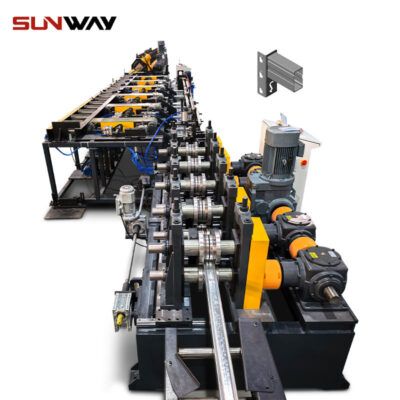 Storage Rack Shelf Box Panel Making Machine Steel Storage Rack System Box Beam Roll Forming Line
Storage Rack Shelf Box Panel Making Machine Steel Storage Rack System Box Beam Roll Forming Line -
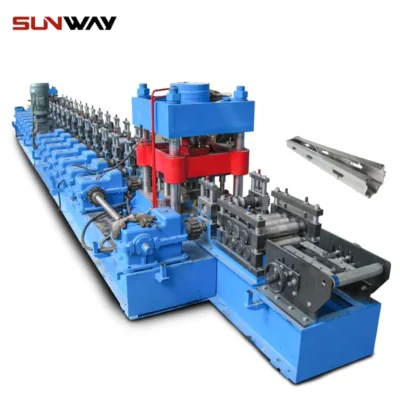 Vineyard Post Roll Forming Machine
Vineyard Post Roll Forming Machine -
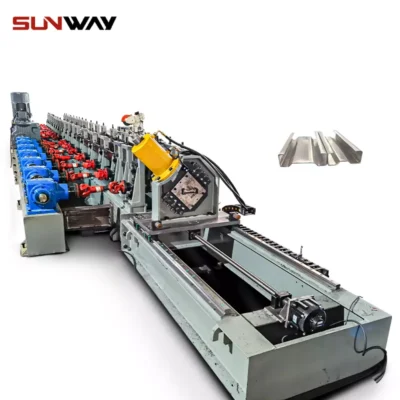 Auto Size Changeable Sigma Purlin Roll Forming Machine
Auto Size Changeable Sigma Purlin Roll Forming Machine -
 Auto Size Changeable C Z Purlin Roll Forming Machine
Auto Size Changeable C Z Purlin Roll Forming Machine -
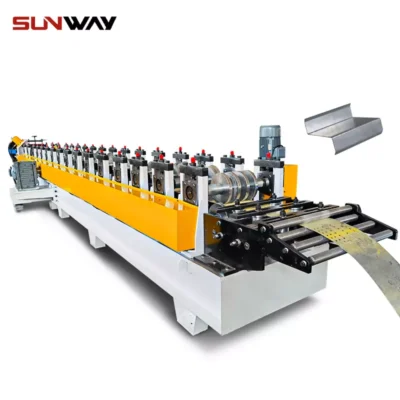 Auto Size Changeable Z Purlin Roll Forming Machine
Auto Size Changeable Z Purlin Roll Forming Machine -
 Auto Size Changeable C U Purlin Roll Forming Machine
Auto Size Changeable C U Purlin Roll Forming Machine -
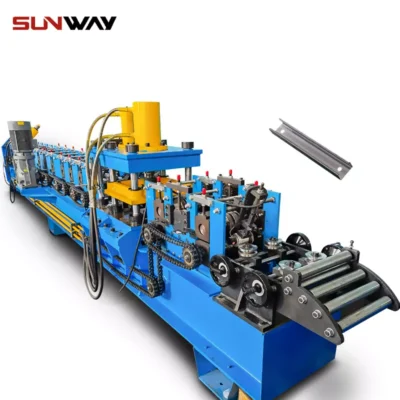 C Section Bracing Omega Storage Rack Upright Post Roll Forming Machine
C Section Bracing Omega Storage Rack Upright Post Roll Forming Machine -
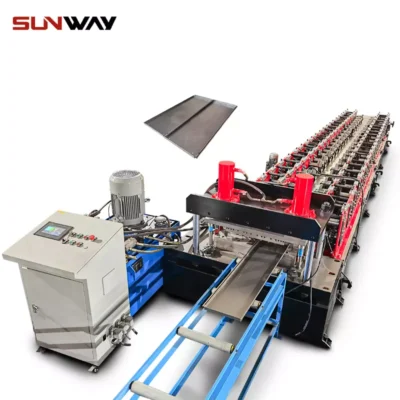 Steel Box Plate Making Roll Forming Machine
Steel Box Plate Making Roll Forming Machine -
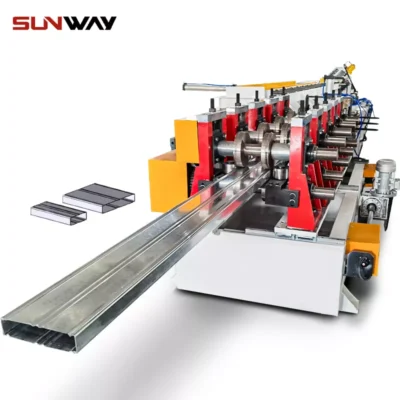 Box Beam Steel Roll Forming Machine For Shelf Column
Box Beam Steel Roll Forming Machine For Shelf Column
How Corrugated Steel Roofing Works: The Installation Process
Corrugated steel roofing involves laying sheets over a substrate, securing them with screws, bolts, or rivets. The corrugated design helps distribute the weight of rainwater and snow, making it more resistant to damage. Here’s a quick overview of the process:
Step 1: Prepare the Roof Deck
Before installation, ensure that the roof deck is clean, smooth, and ready to hold the weight of the metal sheets. If the roof is being installed over existing shingles, make sure the structure can bear the extra load.
Step 2: Apply Underlayment
An underlayment, typically a waterproof membrane, is applied over the roof deck. This layer provides an extra line of defense against moisture penetration and adds insulation.
Step 3: Install the Starter Strip
A starter strip is installed along the roof edge to align the first row of corrugated steel sheets and ensure they are fastened correctly.
Step 4: Fasten the Steel Sheets
Each corrugated steel sheet is overlapped by at least one ridge to ensure a water-tight seal. Screws or rivets are then used to secure the sheets to the roof deck.
Step 5: Add Flashing and Ridge Caps
Flashing is installed around roof features like chimneys, vents, and skylights to prevent water infiltration. Ridge caps are added along the roof’s peak to seal the edges and protect the roof from wind and moisture.
Key Components of Corrugated Steel Roofing
| Component | Function |
|---|---|
| Corrugated Steel Sheets | Provide primary roofing material, offering durability, weather resistance, and strength. |
| Fasteners (Screws/Rivets) | Secure the steel sheets to the roof deck and prevent wind uplift. |
| Underlayment | Creates a moisture barrier between the steel sheets and the roof deck. |
| Flashing | Protects joints and roof features from water leaks. |
| Ridge Caps | Seals the roof’s peak and prevents moisture infiltration. |
| Drip Edge | Directs water away from the roof and into gutters, protecting the edge of the roof. |
| Sealants | Ensures waterproofing at seams, fasteners, and overlaps. |
Machine Speed and Efficiency in Corrugated Steel Sheet Production
| Machine Type | Max Speed | Efficiency | Sheet Output Per Hour |
|---|---|---|---|
| Roll-Forming Machine | 20 m/min | High | 120-150 sheets |
| Hydraulic Shearing Machine | 15 m/min | Moderate | 80-100 sheets |
| Stamping Machine | 25 m/min | High | 150-200 sheets |
Customized Mechanical Parameters for Corrugated Steel Roofing Production
| Parameter | Description | Options/Range |
|---|---|---|
| Sheet Thickness | Determines strength and durability | 0.18mm to 1.2mm |
| Corrugation Height | Affects strength and appearance | 12mm to 45mm |
| Width Coverage | Width of the roof covered per sheet | 600mm to 1100mm |
| Coating Weight | Thickness of the protective zinc or paint coating | 80g/m² to 275g/m² |
| Steel Grade | Defines the strength and flexibility of the steel | G550, G350, G300 |
Corrugated Steel Roofing: Applications and Uses
| Application | Typical Uses |
|---|---|
| Residential Buildings | Homes, garages, sheds, and outbuildings |
| Commercial Buildings | Warehouses, factories, retail stores, and shopping centers |
| Agricultural Structures | Barns, silos, and equipment storage |
| Industrial Buildings | Manufacturing plants, power stations, and processing units |
| Marine Structures | Docks, piers, and coastal structures |
| Architectural Applications | Decorative panels, facades, and modern roofing designs |
Installation, Operation, and Maintenance of Corrugated Steel Roofing
| Task | Description | Frequency |
|---|---|---|
| Installation | Laying steel sheets, applying fasteners, adding flashing | Once (Initial) |
| Operation | Regular roof checks, ensuring no loose fasteners or leaks | Yearly |
| Maintenance | Cleaning debris, resealing edges, replacing damaged sections | Every 5-10 years |
Top Corrugated Steel Roofing Suppliers and Price Range
| Supplier Name | Location | Price Range | Notable Features |
|---|---|---|---|
| ABC Metal Roofing | USA | $3 – $5 per square foot | Wide variety of coatings and colors available |
| Tata Steel | Global | $4 – $6 per square foot | Durable, environmentally friendly products |
| BlueScope Steel | Australia, Global | $3.50 – $5.50 per square foot | High corrosion resistance, long-lasting |
| Metal Sales Manufacturing | USA | $4 – $7 per square foot | Sustainable, ENERGY STAR rated products |
| Ruukki Construction | Europe | $5 – $8 per square foot | Premium metal roof with advanced coating systems |
How to Choose a Corrugated Steel Roofing Supplier
When choosing a supplier for your corrugated steel roofing needs, consider the following factors:
- Material Quality: The grade of steel and type of coating will affect the durability and longevity of your roof.
- Reputation: Opt for a supplier with a solid track record and positive customer reviews.
- Customization Options: Look for companies that offer customizations in terms of sheet thickness, color, and corrugation styles.
- Price vs. Performance: It’s essential to balance cost with quality. Sometimes paying a little more upfront can save money in the long run due to less maintenance and replacement costs.
- Warranty: A good warranty provides peace of mind. Ensure the supplier offers comprehensive coverage on their products.
Advantages and Limitations of Corrugated Steel Roofing
| Feature | Advantages | Limitations |
|---|---|---|
| Durability | Long lifespan (40-70 years), resistant to corrosion | Can be prone to dents from hail or falling objects |
| Lightweight | Easier installation, requires less structural support | May require additional insulation for soundproofing |
| Eco-Friendly | 100% recyclable, low environmental impact | Higher initial cost compared to asphalt shingles |
| Aesthetic Options | Available in various colors and finishes | Some homeowners may not like the industrial look |
| Energy Efficiency | Reflects heat, reduces cooling costs | May require additional layers for thermal insulation |
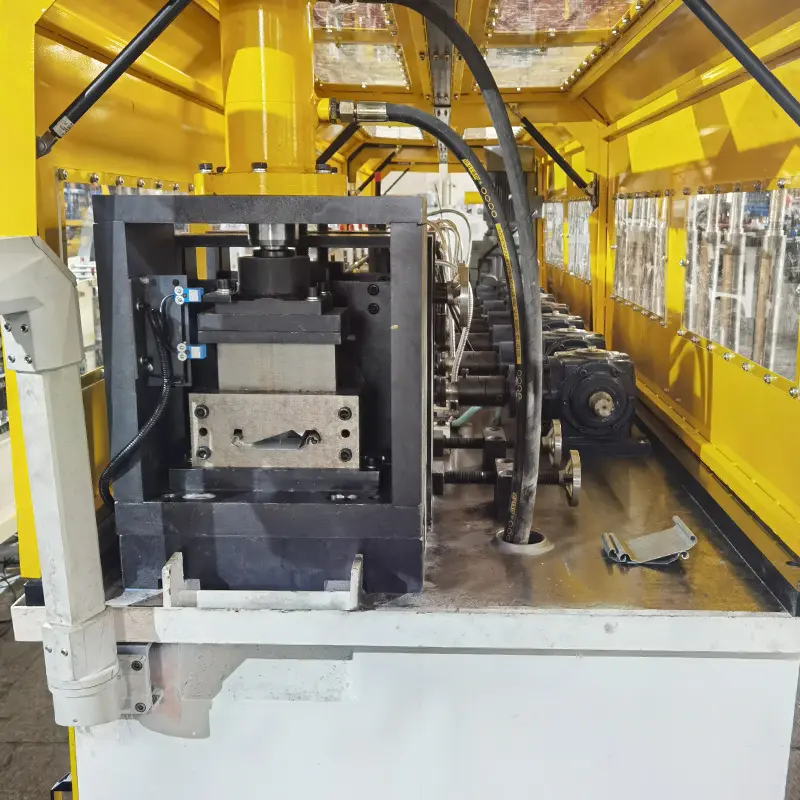
FAQs
| Question | Answer |
|---|---|
| How long does corrugated steel roofing last? | Corrugated steel roofs can last between 40-70 years depending on the material type, coating, and maintenance routine. |
| Is corrugated steel roofing energy efficient? | Yes, metal roofs reflect solar heat, which can reduce cooling costs in hot climates by up to 25%. |
| Does corrugated steel roofing rust? | Galvanized, Galvalume, and coated steel roofing are highly resistant to rust, especially with proper maintenance and in non-corrosive environments. |
| Is steel roofing noisy during rain? | Without proper insulation, metal roofs can be noisier than traditional roofs, but underlayment and insulation can significantly reduce the noise. |
| Can corrugated steel be installed over shingles? | Yes, in many cases, corrugated steel can be installed over an existing shingle roof, as long as the structure can support the extra weight. |
| Is corrugated steel roofing eco-friendly? | Absolutely, corrugated steel roofing is 100% recyclable, making it a sustainable choice for roofing. |
Conclusion
In conclusion, corrugated steel roofing stands out as an excellent roofing option due to its durability, corrosion resistance, eco-friendliness, and wide range of design options. Whether you’re looking for a roof that can withstand harsh coastal climates or one that adds aesthetic appeal to your home, there’s a corrugated steel roofing type to meet your needs.
